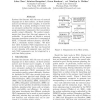Free Online Productivity Tools
i2Speak
i2Symbol
i2OCR
iTex2Img
iWeb2Print
iWeb2Shot
i2Type
iPdf2Split
iPdf2Merge
i2Bopomofo
i2Arabic
i2Style
i2Image
i2PDF
iLatex2Rtf
Sci2ools
123
click to vote
COLING
2002
2002
Towards Automatic Generation of Natural Language Generation Systems
Systems that interact with the user via natural language are in their infancy. As these systems mature and become more complex, it would be desirable for a system developer if there were an automatic method for creating natural language generation components that can produce quality output efficiently. We conduct experiments that show that this goal appears to be realizable. In particular we discuss a natural language generation system that is composed of SPoT, a trainable sentence planner, and FERGUS, a stochastic surface realizer. We show how these stochastic NLG components can be made to work together, that they can be ported to new domains with apparent ease, and that such NLG components can be integrated in a real-time dialog system.
Related Content
| Added | 17 Dec 2010 |
| Updated | 17 Dec 2010 |
| Type | Journal |
| Year | 2002 |
| Where | COLING |
| Authors | John Chen, Srinivas Bangalore, Owen Rambow, Marilyn A. Walker |
Comments (0)

